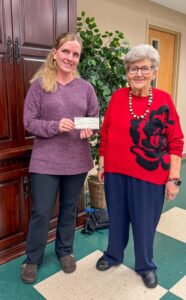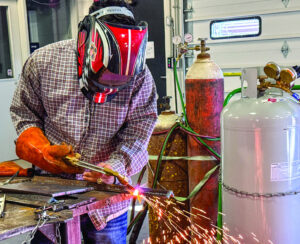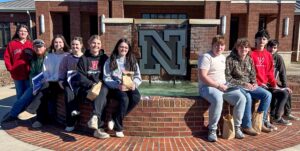Hand-picked herd: Cousins operate Premier Angus Genetics to raise cream-of-the-crop cattle
Tidwell and Ergle don’t have a run-of-the-mill cattle farm, though. It was in 2013 that Ergle attended a cattle sale in Missouri and called Tidwell to pitch an idea: a cattle farm based on embryo transfer and using genetics to breed the best cattle in the industry. Tidwell was on board, and the two started Premier Angus Genetics just a few months later.
Tidwell and Ergle are third-generation – and their sons are fourth-generation – cattle farmers, so the heritage runs deep in their families. With their foundation in commercial cattle, Tidwell and Ergle were ready to “level up” to producing registered purebred seedstock.
“We find cows with the best genetics you can find anywhere in the country, and we buy those cows and bring them back here, and through the process of embryo transfer, we will stimulate a cow to produce multiple eggs at a time. Then we find the best bulls we can find in the country and buy semen from those top-genetics bulls across the country to fertilize those eggs,” explained Ergle, who serves as president and CEO of the Phil Campbell-based farm. “It’s no different than the science that is used in reproduction in humans. We place those embryos in surrogate mothers – we call them recipients – and those surrogate mothers have the calves as their own, nurse those calves, and then when they are of weaning age we pull them off the cows, raise them up to breeding age and sell them to someone who wants to start a cattle business of their own.”
Ergle said the science of the process intrigued him, and “I knew it was an opportunity for us to do something in this area no one else does. That’s what started it all.”
Tidwell, who serves as vice president and CFO, explained why someone might choose an animal with defined genetics: namely, the information that can be distinguished by knowing the cow’s DNA, like “what size the calf is going to grow up to be, if it’s going to be a good milk-producer, if it’s going to be an easy calving, what size calves they are going to be producing. You can tell all of that from the genetics.”
“We are able to pull DNA samples from our cattle as soon as they hit the ground and send it in to the American Angus Association,” Ergle added. “The American Angus Association can analyze that DNA.”
They are not, however, creating GMO cattle – a point both men find it important to emphasize. “All we are doing is taking what God made in the best of the cows and the best of the bulls and pairing those together using some science,” explained Ergle – and, as Tidwell added, “giving them the nutrients they need to allow them to exceed in the potential they have. There’s a lot that goes into getting the cattle to excel in the potential that they have.”
Everyone who works at Premier Angus Genetics is beef quality assurance certified, Ergle said. “We handle all of our cattle without the use of prods and sticks and yelling at them and shoving them around,” he explained. “We treat them really well. In addition to that, we don’t pump them full of hormones or steroids or anything.”
The operation also includes a beef business, branded Premier Angus Beef. Their product is USDA approved, and right now they can’t keep up the supply to meet the demand. They also sell hay to the public.
For both men, Premier Angus Genetics is a side business; Tidwell operates Northwood Machinery, and Ergle works in healthcare with Restore Therapy Services. That means late nights, early mornings and long weekends working their 300 acres – plus the 700 acres they lease – to make it happen, plus scheduling precision. They both said all the hard work is worth it because its work they both love. Members of their family work alongside them, and sometimes they even have friends who volunteer to come help for free, just to have the opportunity to be a part of it all – even though it’s not easy. “At any point you might have cow poop from your toes to your ears,” Ergle said. But they work hard, play hard. “Say we have a good hard day’s work – then we’ll get some of our angus beef and have a cookout,” Tidwell said. “It’s a blast. (My son) Alston plays guitar, and a couple other people around here play, and they all get together, and we have a really good time.”
Tidwell and Ergle both give credit to their fathers, David Tidwell and Milton Ergle, for raising them in the cattle industry as well as for continuing to work with them today – although both fathers were skeptical about the genetics-based concept at first. Ergle’s father told him, “You’ll never make it in this business. You’ll never sell one cow, one bull. You’re an idiot.” But Tidwell said after their first crop of calves sold, they were able to make believers out of their dads, who now help work the operation as well as purchase cattle from their sons. “We couldn’t do it without them,” Tidwell said. “They out-work us.” Ergle agreed, adding, “They won’t let us do anything on the farm without them being there … When our dads can no longer help us, we will have to either hire outside help or retire from our ‘day jobs’ and do this full time.”
For both farmers, family is an important aspect of Premier Angus Genetics. Tidwell and his wife Beverly have two children, 21-year-old Alston and 15-year-old Anna, as well as step-grandson Drake. Ergle and wife Elisha – who serves as photographer and web designer for the business and is beef spokesperson for the Alabama Cattlemen’s Association – have 10-year-old son Miles, 11-year-old daughter Rylee and 7-year-old daughter Kastyn.
“For me it’s about having the opportunity right here in Phil Campbell, Alabama, to do what the top cattle producers in the world are doing,” Ergle said. “There’s no place I’d rather be than with my family right here on these farms.”
Tidwell agreed. “There’s no other place like it on earth.”
Photos by Montana Hester








